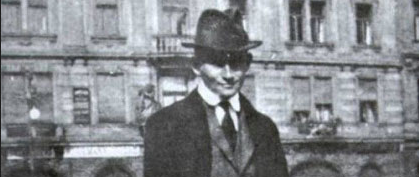Teaching Delivery and Timetables
Knowing how much time you will be on campus this year will help you to make important decisions and plan your college experience effectively. We have important information for you about your timetable and how teaching will be delivered to help you.
Stanley Corngold: Kafka and the Poetry of Risk Insurance
7 Apr 2016

The CASiLaC Research Cluster European Thought and Global Inspiration cordially invites you to a new lecture in the series German Thinkers and the European Tradition
Stanley Corngold
Kafka and the Poetry of Risk Insurance
Thursday 14th April, 5pm
CACSSS Mary Ryan Seminar Room, ORB G27
Kafka’s stories allude to his culture with a fullness that is astonishing when one considers their economy of form. This work of allusion, a sort of movement through the cultural vehicles or media of his time, conforms to several logics. One such logic—the logic of risk insurance--comes from Kafka’s daytime preoccupation with accident insurance. Between 1908 and 1922, Kafka, a Doctor of Laws, rose to a high-ranking position at the Workmen’s Accident Insurance Institute for the Royal Imperial Kingdom of Austria-Hungary in Prague. Though ensconced in a semi-opaque bureaucracy, Kafka struggled to enforce compulsory universal accident insurance in the areas of construction, toy and textile manufacture, farms, and automobiles. Images from his work world, such as mutilation by machine, the perils of excavating in quarries while drunk, and the disappearance of the personal accident, penetrate “In the Penal Colony,” The Trial, and “The Metamorphosis.” An illustrated lecture will explore these images as they relate to the logic of risk insurance in Kafka’s literary practice.
Stanley Corngold is Professor Emeritus of German and Comparative Literature at Princeton. He has published widely on modern German writers and thinkers (e.g. Dilthey, Nietzsche, Musil, Kraus, Mann, Benjamin, Adorno, among others), but for the most part he has been translating and writing on the work of Franz Kafka. On his retirement in 2009, Corngold received the Howard T. Behrman Prize for Distinguished Achievement in the Humanities at Princeton.
